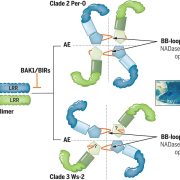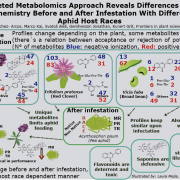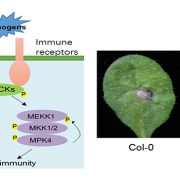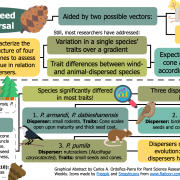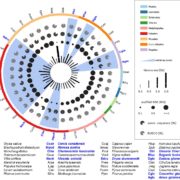Increase in monoderm bacteria in drought-delayed early sorghum root microbiomes (PNAS)
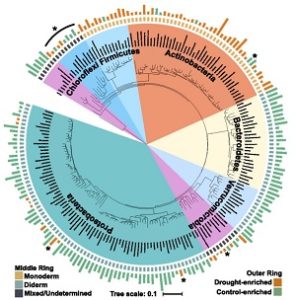 Drought stress drastically decreases crop productivity. Some root-associated bacteria have been shown to decrease the negative effects of drought stress on plants, but the role of drought in the development of the root microbiome has not been studied. Xu and colleagues use root metabolomics and 16S rRNA amplicon and metatranscriptome sequencing to elucidate the impact of drought on the development of the early sorghum root microbiome. Drought delays the development of the root microbiome and increases the abundance and activity of monoderm bacteria (bacteria without an outer cell membrane and with thick cell walls). The shift in community composition is correlated with altered plant metabolism and with the increased activity of bacterial ABC (ATP-binding cassette) transporter genes. Inoculating soil with monoderm isolates increases the colonization of sorghum roots during drought and positively impacts plant growth. These results describe the effects of drought on the root microbiome and indicate the importance of temporal sampling when studying microbiomes. (Summary by Julia Miller) Proc. Natl. Acad. Sci. USA 10.1073/pnas.1717308115
Drought stress drastically decreases crop productivity. Some root-associated bacteria have been shown to decrease the negative effects of drought stress on plants, but the role of drought in the development of the root microbiome has not been studied. Xu and colleagues use root metabolomics and 16S rRNA amplicon and metatranscriptome sequencing to elucidate the impact of drought on the development of the early sorghum root microbiome. Drought delays the development of the root microbiome and increases the abundance and activity of monoderm bacteria (bacteria without an outer cell membrane and with thick cell walls). The shift in community composition is correlated with altered plant metabolism and with the increased activity of bacterial ABC (ATP-binding cassette) transporter genes. Inoculating soil with monoderm isolates increases the colonization of sorghum roots during drought and positively impacts plant growth. These results describe the effects of drought on the root microbiome and indicate the importance of temporal sampling when studying microbiomes. (Summary by Julia Miller) Proc. Natl. Acad. Sci. USA 10.1073/pnas.1717308115


